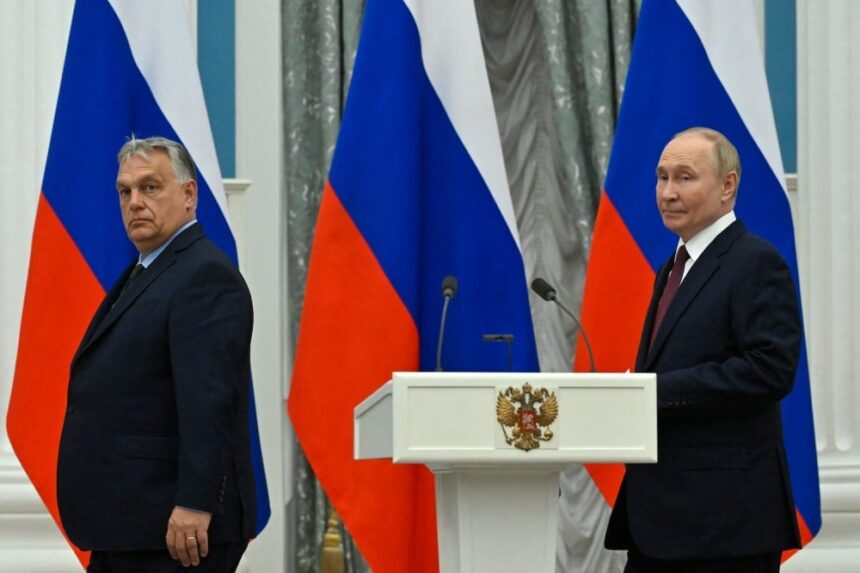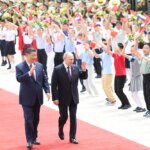Summary by Geopolist | Istanbul Center for Geopolitics:
The article from Foreign Policy examines Hungarian Prime Minister Viktor Orbán’s approach to the Russia-Ukraine war and his relationship with Moscow.
Key Points:
1. Orbán’s Pro-Russian Stance:
- Political Alignment: Hungarian Prime Minister Viktor Orbán has maintained a pro-Russian stance, positioning Hungary as a major supporter of Russia within the European Union. This alignment contrasts with the broader EU consensus supporting Ukraine in its conflict with Russia.
2. National Interests and Political Strategy:
- Economic and Political Interests: Orbán’s support for Russia is partly driven by Hungary’s economic interests, including energy dependence on Russian oil and gas. His political strategy also involves leveraging his relationship with Russia to consolidate domestic power and appeal to his base.
3. Tensions with the EU:
- EU Relations: Hungary’s pro-Russian position has strained its relationship with other EU member states and institutions. The EU has expressed concerns over Hungary’s alignment with Russian interests, affecting its stance on sanctions and other measures against Russia.
4. Impact on the Russia-Ukraine War:
- Influence on the Conflict: Orbán’s stance influences the EU’s overall approach to the conflict, highlighting divisions within the bloc. Hungary’s support for Russia complicates the EU’s unified response to the war and its support for Ukraine.
5. Future Implications:
- Potential Outcomes: The article discusses the potential long-term implications of Orbán’s policies for Hungary’s role in the EU and its foreign policy. The continued alignment with Russia may affect Hungary’s relationships within the EU and its position on the global stage.
In summary, the article highlights Viktor Orbán’s pro-Russian policies and their impact on Hungary’s relations with the EU and its role in the Russia-Ukraine conflict. Orbán’s approach reflects a strategic alignment with Russian interests, creating friction within the EU and complicating the bloc’s unified response to the ongoing war.
For more details, read the full article here below.
How Orban Became Putin’s Pawn
In 19th-century Russia, Nikolai Gogol’s “dead souls” were deceased serfs who were nonetheless valuable. For 21st-century Russia, dead souls aren’t serfs, though they often act like it. Rather they are a legion of useful idiots who do Moscow’s bidding in places such as Washington, London, Paris—and Budapest.
Among all of Russia’s useful idiots, few have sought to make themselves more useful than Hungarian Prime Minister Viktor Orban.
The Hungarian leader, who just last week took over the rotating presidency of the Council of the European Union—a gig assignment that somehow carries even less weight than its name suggests—promptly jetted off to Moscow for his first trip in his new ceremonial role. There, Orban acted more like an ambassador called back for consultations than a European statesman, parroting Kremlin talking points and doing his best to undermine Ukraine’s desperate fight to preserve its territory, its sovereignty, and even its children’s hospitals. He then went on to Beijing to cozy up to the main supplier of critical military technology for Russia’s meat-grinder war.
Orban kicked off a hornet’s nest in Brussels, not just by going to Moscow and Beijing and purporting to act for the 27-nation bloc but because all he did was regurgitate Russian propaganda. In a letter to the real EU president, Charles Michel, Orban claimed that Russia was winning the war so hard that it wanted to begin peace talks immediately—the starting point of which would be the permanent occupation of bits of Ukraine that Russian troops haven’t even occupied or vaporized yet. The condemnations from EU officials were so fast and furious that they could yet be a new franchise in the film series.
The question isn’t so much what Orban is doing as much as why he is doing it at all. Hungary is a member of both NATO and the EU. Both of those blocs, writ large, are trying to stop Russia from further terrorizing Ukraine. Yet Orban, whether in his pilfered European garb or his more comfortable homegrown nationalist attire, persists.
“Hungary is the extension of Russian foreign policy. At the moment, Orban is [Russian President Vladimir] Putin’s most useful idiot,” said Peter Kreko, a nonresident senior fellow with the Democratic Resilience Program at the Center for European Policy Analysis.
Superficially, Orban could be taken for a simple mercenary. Hungary, after all, does seem to get preferential terms on energy imports from Russia. That remains a big deal, especially after Moscow’s invasion of Ukraine and the resulting wave of EU and U.S. sanctions on Russian gas and oil exports that has caused spiraling energy prices in Europe. And for far-right Hungarians, for whom Orban is the petard-bearer, there are bits of western Ukraine that would fit more comfortably back inside Hungary, the way things were before World War I redrew maps and modernity.
The problem is they don’t get good deals and they won’t get new lands. Hungary does rely extensively on Russia for natural gas and even some nuclear power plants, but Orban has not managed to turn vassalage into even the kind of price discount that China enjoys for importing blacklisted Russian energy.
“The figures don’t add up. Not that the terms of the contracts are made public, but you can determine the price of the gas, and it seems like Hungary has paid an enormous amount,” Kreko said. Add that on top of all the other EU funds that Budapest has forgone because of Orban’s trampling of the rule of law and assorted other foibles, and it is clear that his bromance with Putin now pays fewer dividends than Gazprom.
“It has brought him nothing good so far—nothing,” Kreko said.
To understand why a European leader, a standing member (if not a member in good standing) of two of the most exclusive clubs in the world—the EU and NATO—would crawl to Moscow in the middle of the continent’s worst war in three generations requires going back just that far. It’s not that Orban loves Putin. It’s that he hates the West.
Russia’s original Vladimir and first puppet master—Vladimir Lenin—was happy to take German money to cause mischief inside and outside Russia, a pattern that merrily continues to this day. But Orban has taken German ideas instead and added a homegrown grievance.
Nobody in the West today reads Oswald Spengler, the German Cassandra of the early 20th century whose The Decline of the West was an homage to farm life, the simple Volk, and a denunciation of scheming, rootless cosmopolitans. But Orban seems to have, and he kept receipts. (One of Orban’s planks for his six months in the EU presidency is to promote a “farmer-oriented” agricultural policy.) With his chameleon-like transformation from a reformist, liberal politician after the fall of the Berlin Wall to a textbook authoritarian, Hungary’s leader made the world safe for “illiberal democracy.”
“I really think he is channeling Spengler,” Kreko said. “You can read Spengler, and it sounds like an Orban speech. He really believes in the decline of the West.”
But Hungarians of Orban’s ilk have a different grievance that seems academic and dusty yet explains much of the animus on display. When the Allies won the Great War, they signed peace treaties with the losers, such as the infamous Treaty of Versailles that gave an Austrian watercolorist so much to talk about in German beer halls and bunkers.
Hungary had its own treaty, Trianon, and it is very much still a live wire. The treaty eviscerated Hungary’s territory and culled its population by giving away much of its land and removing many of its people. U.S. President Woodrow Wilson, the famous champion of self-determination and moral values, lifted not a finger to help. A generation later, in 1956, when Russian tanks rolled into Hungary to stamp out the barest green shoots of dissent, Washington and the West were nowhere to be found.
Patriotic Hungarians were aghast last week that Orban would go cap in hand to Moscow, given the historical memories. But from his point of view, the West has brought nothing good; Russia has brought plenty of bad, but that was then.
“If [former U.S. President Donald] Trump can turn the party of Reagan pro-Russia, Orban can make Hungary more pro-Russia as well, even if we have had more bad experiences with Russia,” Kreko said. “History is shortsighted and can easily be rewritten.”
That points to the larger problem of Orban: He is not alone in Europe but stands first among unequals. His far-right grouping just remade the European Parliament, with a huge assist from France’s own pro-Russia, far-right movement that last week flirted with winning control of the French National Assembly; the movement’s figurehead had vowed to paralyze French aid to Ukraine. The new power bloc didn’t exactly go over well with other European leaders.
In Britain, Nigel Farage, he of Brexit fame, created a new party bent on destruction, but this time he targeted the Conservative Party as much as Europe or migrants and was almost as successful: The Tories had their worst election ever, and Farage at long last won a seat in Westminster. One of Farage’s biggest cheerleaders during the election was Russia’s foreign ministry. Germany has its own far-right Russophiles, but Moscow already captured Berlin years ago.
The biggest elephant in the room remains overseas, in the United States. Trump and Orban not only have a mind meld—Orban’s canceled speech to the European Parliament was literally titled “Make Europe Great Again”—but also a tactical cooperation. If Britain was long the beachhead for American trans-Atlanticists, Hungary is the landing zone and inspiration for America’s far right.
Case in point: Orban will make his way to Mar-a-Lago, Florida, to meet with Trump just after this week’s NATO summit, less than a week after checking in with Putin. In spy novels at least, cutouts are meant to disguise the connection.
Russia has always had its fellow travelers, especially since the Bolshevik Revolution more than a century ago; some of them were useful idiots peddling the Kremlin’s line around the world, while others were more idiots than useful. What is alarming today is that the idiots are becoming, in many cases, pivotal.
By Keith Johnson
Source: Foreign Policy







